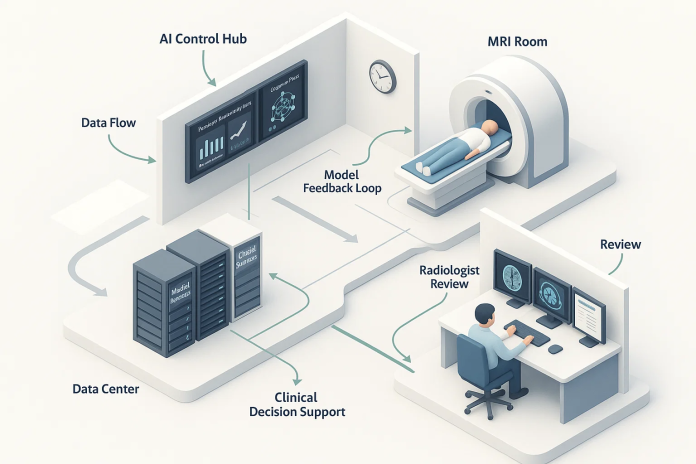Introduction: A New Era for Cancer Detection
AI-powered radiology service is now operational across the NHS, thanks to the National Institute for Health and Care Research (NIHR). The service brings together The Royal Marsden NHS Foundation Trust, NTT DATA, and CARPL.ai to deliver cutting-edge diagnostic tools aimed at improving speed and accuracy in detecting various cancers, including sarcoma, lung, breast, brain, and prostate. Early evidence suggests this AI-powered radiology service could be a game-changer in clinical oncology by offering faster results and more precise diagnostics.
What is the AI-Powered Radiology Service?
The AI-powered radiology service provides a unified clinical imaging platform where healthcare professionals can evaluate a suite of AI models across real patient images. The platform supports:
- Image Upload & Management: Clinicians upload CT, MRI, and PET scans.
- AI Model Library: Multiple validated models analyze anatomy-specific markers, like lung nodules or breast lesions.
- Real-World Performance: Models tested in live settings, reflecting actual clinician workflows.
- Outcome Tracking: Tracks metrics like detection accuracy, time saved per scan, and diagnostic confidence.
This centralized system is designed to assist clinicians in diagnosing and monitoring cancers more efficiently, reducing the risk of diagnostic delays and misinterpretation.
How the AI-Powered Radiology Service Works
1. Collaborative Development
Funded by a NIHR grant, the service combines NHS expertise (clinical needs), NTT DATA’s technology (platform build), and CARPL.ai’s AI proficiency to create a scalable, compliant imaging ecosystem.
2. Clinical Validation
Radiology teams at The Royal Marsden and the Institute of Cancer Research assess different AI models on real clinical cases, ensuring each algorithm is thoroughly vetted before deployment.
3. Operational Integration
A cloud-based environment allows seamless integration with NHS imaging systems. AI outputs—like highlighted tumor boundaries or suspicious lymph nodes—feed directly into radiologists’ workflows, with visual overlays and quantitative reports.
Benefits of the AI-Powered Radiology Service
Faster Diagnosis
AI speeds up scan reads by identifying abnormalities within seconds, reducing backlog and enabling prompt clinical decisions.
Enhanced Accuracy
Machine learning helps detect subtle findings often missed in manual review, increasing early-stage cancer detection rates.
Reduced Clinician Burden
Automated image analysis cuts down routine tasks, letting radiologists focus on complex cases and direct patient care.
Standardized Analysis
Consistent AI model performance across NHS sites minimizes qualitative variability, facilitating uniform quality standards.
Clinical Impact: Real-World Applications
- Sarcoma: Detecting small, early-stage soft tissue tumors that are often overlooked.
- Lung Cancer: Early identification of pulmonary nodules, leading to timely intervention.
- Breast Cancer: Improved differentiation between benign and malignant lesions in dense breast tissue.
- Brain Tumors: Precise identification of tumor growth or recurrence on MRIs.
- Prostate Cancer: Enhanced detection and classification of lesions in multi-parametric MRI.
Early pilots show that using the AI-powered radiology service reduced radiologist review time by 20–30% and increased detection accuracy, especially for small or complex lesions.
Partnership & Funding
The project is backed by NIHR’s Capital Funding Call, emphasizing NHS priorities such as AI innovation, patient safety, and imaging excellence. Partners include:
- The Royal Marsden NHS Foundation Trust – Clinical leadership
- NTT DATA – Technology and platform development
- CARPL.ai – AI algorithm development and integration
“This AI-powered radiology service represents the cutting edge of cancer research… It is going to transform treatment… ultimately change patients’ lives.” – Professor Mike Lewis (NIHR)
“AI has immense potential to support clinicians in diagnosing and treating cancer earlier and more precisely.” – Professor Dow‑Mu Koh (Royal Marsden)
Future Directions & Scaling Opportunities
Next steps for the AI-powered radiology service include:
- Expanding to More NHS Trusts: Wider pilot deployment across regional centres.
- Regulatory Approvals: Submitting clinical performance data to UK regulatory bodies for broader adoption.
- Model Enhancement: Adding AI modules for additional cancer types (e.g., colorectal, ovarian).
- Outcome Research: Longitudinal studies to measure impact on patient survival, healthcare costs, and clinician workflow.
- International Expansion: Adapting the platform within other national health systems under global partnerships.
Conclusion
The launch of the AI-powered radiology service marks a major step in combining artificial intelligence and clinical care to boost cancer detection, streamline diagnostics, and empower NHS radiologists. As deployment scales, this platform could establish the gold standard for AI integration in hospital imaging worldwide.




